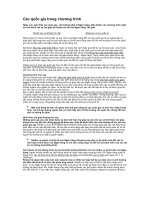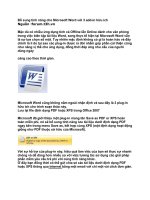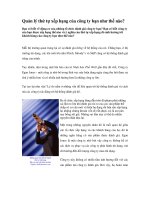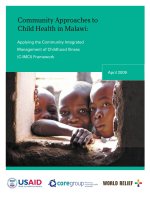Tài liệu Integrated Management of Childhood Illness Caring for Newborns and Children in the Community doc
Bạn đang xem bản rút gọn của tài liệu. Xem và tải ngay bản đầy đủ của tài liệu tại đây (2.12 MB, 14 trang )
Integrated Management of Childhood Illness
Caring for Newborns and Children in the Community
CONTENTS
OVERVIEW: Case Management of the Sick Child 3
Identify problems: ASK and LOOK 4
Danger Signs 5
If any Danger Sign, Refer Child URGENTLY to health facility:
Begin Treatment and Assist Referral 6
Sick but NO Danger Sign (Diarrhoea, Fever, or
Fast Breathing) 7
If Sick but NO Danger Sign, Treat at Home
and Advise on Home Care 8
Give ORS Solution 9
Check Immunizations 10
How to do the Rapid Diagnostic Test for Malaria 11
Sick Child Recording Form 12-13
Generic Version 1: Treat diarrhoea, confirmed malaria, and fast breathing
Caring for the Sick Child
age 2 months up to 5 years
Chart Booklet
for the Community Health Worker
2
WHO Library Cataloguing-in-Publication Data:
Integrated management of childhood illness: caring for newborns and children in the community.
5 v.
Contents: Manual for the community health worker Facilitator notes Photo book: identify signs of illness Chart booklet for the community health worker Training video.
1.Infant welfare. 2.Child welfare. 3.Child health services. 4.Infant, Newborn. 5.Child. 6.Community health services. 7.Teaching materials. I.World Health Organization. II.Title: caring for the sick child in the
community: treat diarrhoea, confirmed malaria, and fast breathing.
ISBN 978 92 4 154804 5 (NLM classification: WA 320)
© World Health Organization 2011
All rights reserved. Publications of the World Health Organization are available on the WHO web site (www.who.int) or can be purchased from WHO Press, World
Health Organization, 20 Avenue Appia, 1211 Geneva 27, Switzerland (tel.: +41 22 791 3264; fax: +41 22 791 4857; e-mail: ).
Requests for permission to reproduce or translate WHO publications – whether for sale or for noncommercial distribution – should be addressed to WHO Press
through the WHO web site (
The designations employed and the presentation of the material in this publication do not imply the expression of any opinion whatsoever on the part of the World
Health Organization concerning the legal status of any country, territory, city or area or of its authorities, or concerning the delimitation of its frontiers or boundaries.
Dotted lines on maps represent approximate border lines for which there may not yet be full agreement.
The mention of specific companies or of certain manufacturers’ products does not imply that they are endorsed or recommended by the World Health Organization in
preference to others of a similar nature that are not mentioned. Errors and omissions excepted, the names of proprietary products are distinguished by initial capital
letters.
All reasonable precautions have been taken by the World Health Organization to verify the information contained in this publication. However, the published material
is being distributed without warranty of any kind, either expressed or implied. The responsibility for the interpretation and use of the material lies with the reader. In
no event shall the World Health Organization be liable for damages arising from its use.
Cover photo J. Lucas
3
OVERVIEW: C
ARING
FOR
THE
S
ICK
C
HILD
IN
THE
C
OMMUNITY
(child age 2 months up to 5 years)
Identify problems:
ASK and LOOK
If any
DANGER SIGN
SICK
but NO Danger
Sign
TREAT
diarrhoea, malaria,
and fast breathing
at home and
ADVISE on home
care
REFER CHILD WITH
DANGER SIGN
URGENTLY TO
HEALTH
FACILITY
Begin treatment
and
Assist referral
Follow up child
on return
ADVISE caregiver
on
immunization
Follow up child
in 3 days
If child
becomes sicker
or does not improve,
REFER
URGENTLY TO
HEALTH
FACILITY
If OTHER PROBLEMS or
any condition you cannot
manage
Refer child to
health facility
OVERVIEW: C
ARING
FOR
THE
S
ICK
C
HILD
4
I
DENTIFY
PROBLEMS
: ASK
AND
LOOK
Cough? If yes, for how long? ____days
Diarrhoea (3 or more loose stools in last 24 hours)? If
yes, for how long? ____days.
If diarrhoea, blood in stool?
Fever (reported or now)? If yes, started ____ days
ago.
Convulsions?
Difficulty drinking or feeding? If yes, not able to drink
or feed anything?
Vomiting? If yes, vomits everything?
Any other problem?
ASK the caregiver: What are the child’s problems?
I
DENTIFY
PROBLEMS
: A
SK
AND
L
OOK
LOOK at the child.
Chest indrawing?
If cough, count breaths in 1 minute: ___ breaths per
minute (bpm).
Unusually sleepy or unconscious?
For child age 6 months up to 5 years,
MUAC strap colour: ________
Swelling of both feet?
5
D
ANGER
S
IGNS
D
ANGER
S
IGNS
REFER URGENTLY
TO HEALTH
FACILITY
Begin treatment
and
Assist referral
If ANY
danger sign
Cough for 21
days or more
Diarrhoea for 14
days or more
Blood in stool
Fever for last 7
days or more
Convulsions
Not able to drink
or feed anything
Vomits
everything
Any
DANGER SIGN?
Chest indrawing
Unusually sleepy
or unconscious
For child age 6
months up to 5
years, red on
MUAC strap
Swelling of
both feet
To begin
treatment and
assist referral
Go to next page
If NO Danger Sign
Go to page 6
6
I
F
ANY
DANGER
SIGN
, R
EFER
C
HILD
URGENTLY
TO
H
EALTH
F
ACILITY
I
F
ANY
DANGER
SIGN
, R
EFER
Explain why child needs to go to the health facility.
GIVE FIRST DOSE OF TREATMENT:
If diarrhoea, and if child can drink, begin giving
ORS solution right away.
If fever AND: convulsions; or unusually sleepy/
unconscious; or not able to drink or feed; or
vomits everything, give rectal artesunate
suppository (100 mg):
Age 2 months up to 3 years—1 suppository
Age 3 years up to 5 years—2 suppositories
If fever AND danger sign other than the 3 above,
give first dose of oral antimalarial AL:
Age 2 months up to 3 years—1 tablet
Age 3 years up to 5 years—2 tablets
If fast breathing or chest indrawing, give first
dose of oral antibiotic (amoxycillin tablet—250 mg):
Age 2 months up to 12 months—1 tablet
Age 12 months up to 5 years—1 tablets
Assist referral to health facility:
Cough for 21 days or more
Diarrhoea for 14 days or more
Blood in stool
Fever for last 7 days or more
Convulsions
Not able to drink or eat anything
Vomits everything
Chest indrawing
Unusually sleepy or
unconscious
For child age 6 months
up to 5 years, red on
MUAC strap
Swelling of both feet
For any sick child who can drink,
advise to give fluids and continue
feeding.
Advise to keep child warm, if child
is NOT hot with fever.
Write a referral note.
Arrange transportation, and help
solve other difficulties in referral.
FOLLOW UP child on return at least
once a week until child is well.
To give ORS solution.
Go to page 9
7
If SICK but
NO danger
sign
TREAT at home
and
ADVISE
on home care
SICK
BUT
NO D
ANGER
S
IGN
SICK
BUT
N
O
D
ANGER
S
IGN
Cough (less than 21 days)
Diarrhoea (less than 14
days AND no blood in stool)
Fever (less than 7 days) in
a malaria area
Fast breathing:
In a child age 2 months up
to 12 months,
50 breaths or more per
minute
In a child age 12 months up
to 5 years,
40 breaths or more per
minute
SICK
but NO Danger Sign?
To TREAT
at home
Go to next page
No problem found
Check immunizations. Go to page 10
8
I
F
SICK
BUT
NO D
ANGER
S
IGN
, TREAT
AT
H
OME
If
Diarrhoea
Give ORS. Help caregiver to give child ORS in front of you
until child is no longer thirsty.
Give caregiver 2 ORS packets to take home. Advise to give as
much as the child wants, but at least 1/2 cup ORS solution
after each loose stool.
Give zinc supplement. Give 1 dose daily for 10 days:
Age 2 months up to 6 months—1/2 tablet
(total 5 tabs)
Age 6 months up to 5 years—1 tablet
(total 10 tabs)
Help caregiver to give first dose now.
If
Fever (less
than 7 days) in
a malaria area
Do a rapid diagnostic test (RDT).
If RDT is positive, give oral antimalarial AL
(Artemether-Lumefantrine).
Age 2 months up to 3 years—1 tablet
(total 6 tabs)
Age 3 years up to 5 years—2 tablets
(total 12 tabs)
Help caregiver give first dose now. Advise to give 2
nd
dose
after 8 hours., and to give dose twice daily for 2 more days.
If
Fast Breathing
(pneumonia)
Give oral antibiotic (amoxycillin tablet—250 mg ).
Give twice daily for 5 days:
Age 2 months up to 12 months—1 tablet
(total 10 tabs)
Age 12 months up to 5 years—2 tablets
(total 20 tabs)
Help caregiver give first dose now.
For
ALL children
treated at
home, advise on
home care
Advise the caregiver to give more fluids
and continue feeding.
Advise on when to return. Go to nearest
health facility or, if not possible, return
immediately if child
Cannot drink or feed
Becomes sicker
Has blood in stool
Advise caregiver on use of a bednet
(ITN)
Follow up child in 3 days.
If child becomes sicker
or does not improve,
REFER CHILD
URGENTLY TO HEALTH FACILITY
To give ORS solution.
Go to page 8
I
F
SICK
BUT
NO D
ANGER
S
IGN
, TREAT
AT
H
OME
A
ND
A
DVISE
ON
H
OME
C
ARE
If Yellow on
MUAC strap
Counsel caregiver on feeding or refer the child to a
supplementary feeding programme, if available.
9
Mix 1 package of ORS with 1 litre of clean water to make ORS
solution.
Show the caregiver how to mix the ORS solution and give it to the
child. Give frequent, small sips of ORS solution from a cup or spoon.
For child with diarrhoea being referred:
Ask the caregiver to continue to give the child ORS solution on the
way to the health facility, if the child can drink. Also, if the child
is breastfed, continue to breastfeed on the way.
For child with diarrhoea to be treated at home:
Help the caregiver to continue to give the child ORS solution in
front of you until child has no more thirst.
Give the caregiver 2 packets of ORS to take home. Advise the
caregiver to continue to give the child at home as much ORS solution as
the child wants, but at least 1/2 cup after each loose stool. Do not keep
the mixed ORS solution for more than 24 hours.
If the child is breastfeeding, advise the mother to breastfeed
frequently and for a longer time at each feed. Give ORS solution in
addition to breastmilk, even if the child is exclusively breastfed.
If the child is exclusively taking a breastmilk substitute, advise the
mother to give ORS solution in addition to the breastmilk substitute.
Give ORS solution
G
IVE
ORS S
OLUTION
10
C
HECK
IMMUNIZATIONS
If any OTHER PROBLEM or condition you cannot manage, refer child to health facility,
write a referral note, and follow up child on return.
I
MMUNIZATIONS
Advise the caregiver on when and where to take the child
for immunizations, if needed.
Age
Birth BCG OPV-0
6 weeks DPT-Hib + HepB—1 OPV-1
10 weeks DPT-Hib + HepB—2 OPV-2
14 weeks DPT-Hib + HepB—3 OPV-3
9 months Measles
[Give OPV-4 if OPV-0
not given at birth]
Vaccine
Check immunizations completed (see child’s health card)
11
12
Insert the
Sick Child Recording Form
13
14
For more information, please contact:
Department of Maternal, Newborn, Child and Adolescent Health
World Health Organization
20 Avenue Appia
1211 Geneva 27
Switzerland
Telephone +41.22.791.3281
Email:
Website:
ISBN 978 92 4 154804 5









